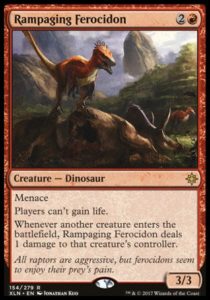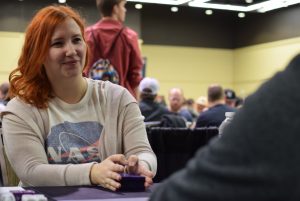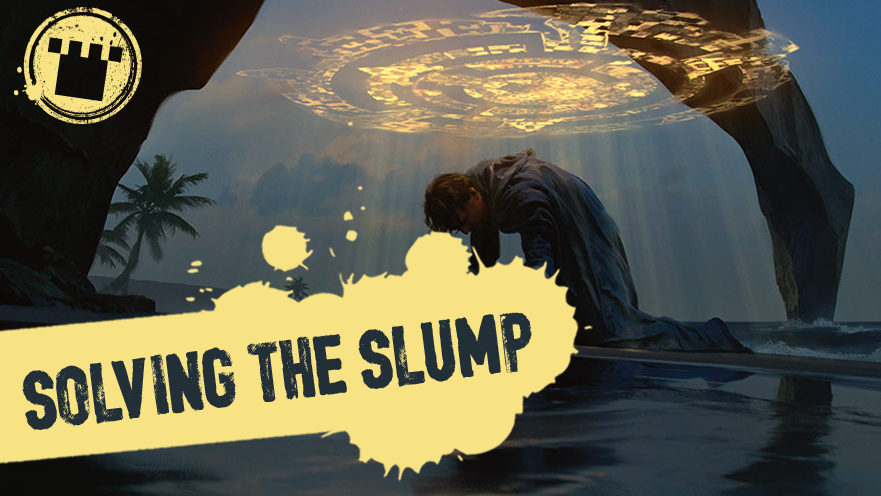On Sunday at Grand Prix Portland, I had just picked up my second loss in the PTQ after scrubbing out of the main event. I was left a little heartbroken, wondering what I could have done differently. Should I have chosen a different deck for Standard? Did I mis-build my sealed pool? Is it just variance? If it’s just variance, I should be coming out on the winning side eventually, right? So why had my losses been ticking up more quickly than my wins at seemingly every turn? Everybody goes through slumps (except maybe Corey Baumeister), but how do you claw your way out of them?
It’s very easy to get angry when variance isn’t on your side, or to blame a top-deck or a bad match-up and dismiss a loss without further reflection. At Grand Prix Portland, I played a midrange Sultai Energy deck, fully recognizing that I was giving up points against aggressive strategies, but believing that those decks would be pushed out of the tournament by other Energy decks that I felt I had good match-ups against. I was 4-1, but after a few quick rounds against Ramunap Red and Blue-Green Pummeler, I found myself at 4-4 and out of the tournament. It was very easy for me to just blame the match-ups, as my teammates got paired up against Temur deck after Temur deck. But you don’t grow without some soul-searching and self-reflection, and I truly believe that not being willing to dive deep into your matches and losses (and wins) is one reason why many competitive players in any sport or hobby stagnate and are unable to achieve personal growth.
Instead of wallowing in my failure (okay, there was a bit of wallowing), I came back to the need for introspection. Yes, I could have – and probably should have – picked a deck for the tournament that had a more favorable aggressive match-up. And looking at the Top 16, with five Ramunap Red decks (and a Red-Green Pummeler list!) in the mix, it is obvious that my desire to be the scissors to Ramunap Red’s rock and Temur Energy’s paper didn’t quite pan out. But every bad experience is still an experience, with opportunities to learn. For each game, win or lose, I would note any minor errors – from small land sequencing mistakes to interesting decisions I could talk out with my team later. Instead of attributing my losses to a poor deck choice, or variance, I made sure to take advantage of the learning opportunities that are inherent in any large tournament.
For example, in one of the matches against Ramunap Red, my opponent had just top-decked a Rampaging Ferocidon. I attacked with my Bristling Hydra, enchanted with a Cartouche of Ambition, into his field of blockers, relying on lifelink to pull me back to a comfortable life total. After reminding me that Rampaging Ferocidon puts a stop to life-gain shenanigans, my opponent cracked back with the full force of his team, dropping my life total low enough that Ramunap Ruins’ inevitability was able to finish me off. Instead of berating myself for my misplay, I regrouped and was able to win game two (although my opponent being on the play game three ended up spelling my disaster). I am also confident in the fact that I won’t be likely to forget about that extra bit of text on Rampaging Ferocidon again.
I also believe it’s important to find the successes within the losses, and celebrate the small victories. Even though I went 4-4, this was the first large tournament I played where I didn’t miss a trigger throughout the entire day (and playing an Energy deck, that is no small feat). Mindfulness has been a focus of mine for the last year or so as I work on improving my game, so being able to look back on my matches and not cringe at missing an enter-the-battlefield effect is an achievement that I can only view as an overwhelming victory.
For me, realistic goal-setting is another key skill to develop. If I hadn’t set the goal to not miss triggers, I wouldn’t have been able to celebrate that success over the weekend. Of course, the overarching goals that we work toward are important – whether they’re winning an FNM or making the Pro Tour – but those little stepping-stone goals are ultimately how we get there. Some focuses of mine currently include: mulliganing more aggressively, re-evaluating my game plan after every draw step, being a more helpful teammate for others as they prepare for events, and learning how to play more interactive Modern decks. These goals range from very specific to very broad, and from gameplay-focused to more general.
I’ll be marking GP Portland as a success in my book, regardless of my record. Any event you can learn from, and walk away from feeling wiser and more self-aware, is never a failure. By reflecting on my decisions and focusing on learning and growing (and not discounting aggressive strategies), the word “slump” begins to lose meaning. By viewing my skill as a Magic player as an investment with long-term returns, the results of individual tournaments begin to matter less and less. Just like spikes and dips in a stock market, the only thing that matters is a general trend upward across time, which can only be achieved by putting effort into the game and keeping an open mind.
So how do you claw your way out of a slump? Focus on growing as a player and the results will follow. Slumps happen, and you can either lament them or learn from them.

A Spike at heart, Chantelle spends her free time prepping for tournaments, working toward the ever-elusive Mythic Championship, and championing other competitive ladies. She’s a combo aficionado and seasoned aggro deck player, and Standard and Modern are her preferred formats. Growing and improving as a player, both technically and in her mental game, are of the utmost importance to her.

